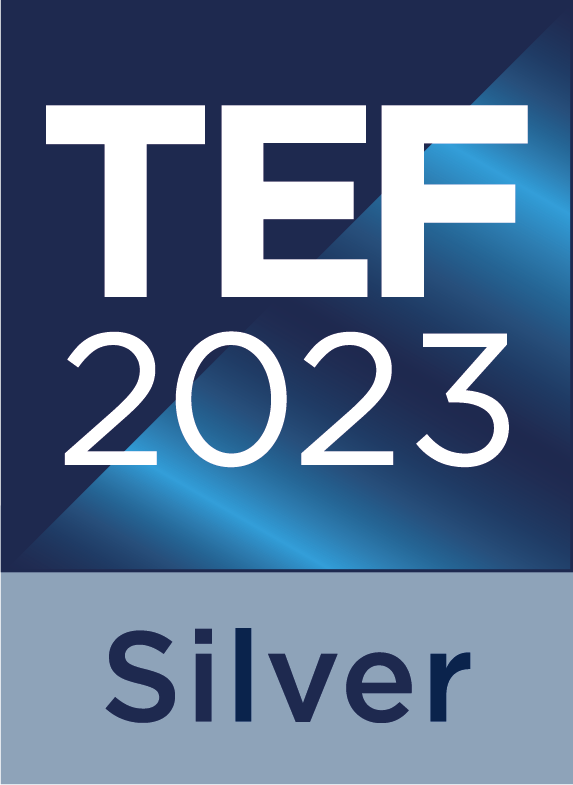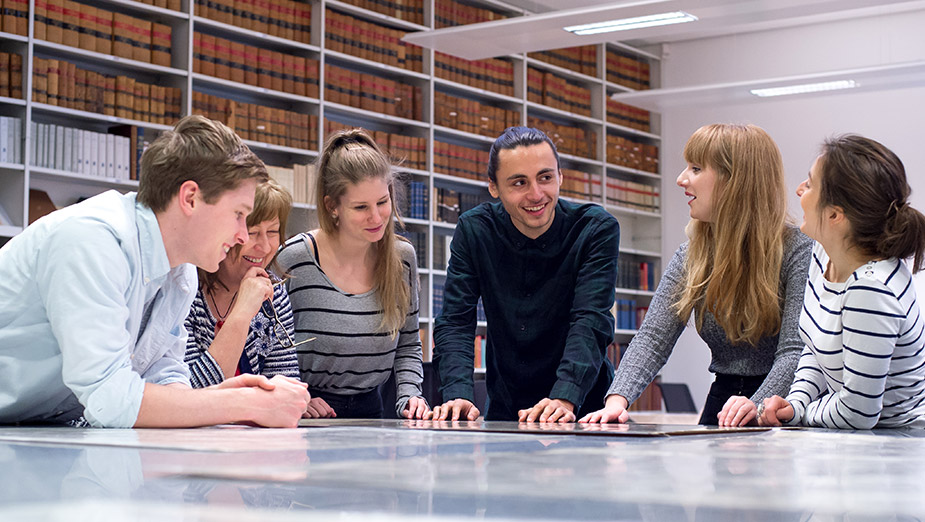Key information
- Duration:
- 3 years full time
- Typical A-level offer:
- ABB
View full entry requirements - UCAS code:
- VL12
- Start date:
- September 2025
- 4th in the UK for our research impact in History in REF 2021 (Times Higher Education)
- =9th in the UK for Politics (QS World University Rankings by Subject 2024)
Do you wish to understand the challenges facing us at a global level? On this course, you’ll develop the skills and knowledge to become a world citizen with a global and critical perspective.
The course combines two distinctive yet complementary approaches to the question of developments at the global level:
- studying International Relations, you’ll analyse global structures by exploring their history, the nature of the global economy, and build a particular focus on the themes of war and security
- studying History, you’ll focus on global history, and the ways that different regions of the world are connected through the movements of people, goods and ideas, through trade, shared transnational cultures, migration, and war and conflict.
We understand that deciding where and what to study is a very important decision. We’ll make all reasonable efforts to provide you with the courses, services and facilities described in this prospectus. However, if we need to make material changes, for example due to government or regulatory requirements, or unanticipated staff changes, we’ll let you know as soon as possible.
The wide array of topics has not only changed my area of interest, but also how I view the subject.”Augusta Oliver
History BA
Entry requirements
A-level
| Typical offer | ABB |
|---|---|
| Contextual offer | View contextual offer Not everyone has the same support to get to higher education – we help you reach your potential. When we receive applications through UCAS, we consider all factors and will sometimes make contextual offers as part of our Access and Participation Plan |
| GCSEs | You should have a broad range of GCSEs 9-4 (A*-C), including good grades in relevant subjects. |
| Extended Project Qualification | We take the EPQ into account when considering your application and it can be useful in the summer when your results are released if you have narrowly missed the conditions of your offer. We do not routinely include the EPQ in the conditions of your offer but we sometimes offer alternative conditions that include the EPQ. If you wish to discuss this further please contact us |
Other UK qualifications
Access to HE Diploma
| Typical offer | Pass Diploma with at least 39 level 3 credits at Merit or above including 24 credits at Distinction |
|---|---|
| Subjects | Humanities or social sciences. |
Cambridge Pre-U Principal Subjects (including A-level mixes)
| Typical offer | M1 M2 M2 If you have one A-level and two Cambridge Pre-U Principal Subjects we would expect you to have grade A at A-level and, M2 and M2 in two Pre-Us. If you have two A-levels and a Cambridge Pre-U Principal Subject we would normally expect you to have grades AB at A-level and M2 in Pre-U. |
|---|---|
| GCSEs | You should also have a broad range of GCSEs grade 9-4 (A*-C), including good grades in relevant subjects. |
International Baccalaureate
| Typical offer | 32 points overall from the full IB Diploma. |
|---|
Pearson BTEC Level 3 National Diploma and one A-level
| Typical offer | Grade B in A-level and Distinction, Distinction in Pearson BTEC Level 3 National Diploma.
|
|---|---|
| Contextual offer | View contextual offer Not everyone has the same support to get to higher education – we help you reach your potential. When we receive applications through UCAS, we consider all factors and will sometimes make contextual offers as part of our Access and Participation Plan |
| GCSEs | You should also have a broad range of GCSEs grade 9-4 (A*-C), including good grades in relevant subjects. |
Pearson BTEC Level 3 National Extended Certificate and two A-levels
| Typical offer | Grades BB in A-levels and Distinction in BTEC Level 3 National Extended Certificate. |
|---|---|
| Contextual offer | View contextual offer Not everyone has the same support to get to higher education – we help you reach your potential. When we receive applications through UCAS, we consider all factors and will sometimes make contextual offers as part of our Access and Participation Plan |
| GCSEs | You should also have a broad range of GCSEs grade 9-4 (A*-C), including good grades in relevant subjects. |
Pearson BTEC Level 3 National Extended Diploma (formerly BTEC Level 3 Extended Diploma)
| Typical offer | DDD |
|---|---|
| Contextual offer | View contextual offer Not everyone has the same support to get to higher education – we help you reach your potential. When we receive applications through UCAS, we consider all factors and will sometimes make contextual offers as part of our Access and Participation Plan |
| GCSEs | You should also have a broad range of GCSEs grade 9-4 (A*-C), including good grades in relevant subjects. |
Scottish Highers
| Typical offer | AABBB |
|---|
Welsh Baccalaureate Advanced
| Typical offer | ABB from the Advanced Welsh Baccalaureate Skills Challenge Certificate and two A-levels |
|---|---|
| GCSEs | You should have a broad range of GCSEs A*-C (9-4), including good grades in relevant subjects. |
International Baccalaureate
| Typical offer | 32 points overall from the full IB Diploma. |
|---|
European Baccalaureate
| Typical offer | Overall result of at least 77%. |
|---|
Other international qualifications
Australia
| Typical offer | Relevant state (Year 12) High School Certificate, and between 88% to 85% in the ATAR or UAI/TER/ENTER, or a Queensland OP of 4 to 5 or better. |
|---|
Austria
| Typical offer | Reifeprüfung or Matura with an overall result of between 2.0 to 2.2 or better for first-year entry. |
|---|
Belgium
| Typical offer | Certificat d'Enseignement Secondaire Supérieur (CESS) or Diploma van Hoger Secundair Onderwijs with a good overall average of 65% or more. |
|---|---|
| Additional requirements | Good grades in subject areas. Our entry requirements are guidelines and we assess all applications on a case-by-case basis. |
Bulgaria
| Typical offer | Diploma za Sredno Obrazovanie with excellent final-year scores (normally 5.5 overall with 6 in key subjects). |
|---|
Canada
| Typical offer | Ontario Secondary School Diploma (OSSD) 70%-75% from 6 grade 12 U, U/C or M courses. British Columbia Certificate of Graduation AABBB-BBBBB from 5 grade 12 courses. We also recognise the High School Diploma from other provinces -including Alberta, Manitoba, New Brunswick- where we look for strong performance in grade 12 subjects, and the Diplome d'Etudes Collegiales (DEC) from Quebec. |
|---|
China
| Typical offer | If you have the Goakao, we will consider applications for direct entry to first year. You would normally need an overall average of 75%, including required subjects. We are also pleased to consider applications if you are following a recognised International Foundation Year or you have one or more years of Higher Education in China at a recognised degree awarding institution. The Senior High School Graduation alone would not be sufficient for entry to our undergraduate degrees, but you may be eligible to apply for our International Foundation Year. If you successfully complete an International Foundation Year, you can progress on to a relevant undergraduate course at Sussex. Check which qualifications the International Study Centre accepts for the International Foundation Year. |
|---|---|
| Additional requirements | Our entry requirements are guidelines and we assess all applications on a case-by-case basis. |
Croatia
| Typical offer | Maturatna Svjedodžba with an overall score of between 4 and 4.2 |
|---|
Cyprus
| Typical offer | Apolytirion of Lykeion with an overall average of between 18/20 and 18.5/20 will be considered for first-year entry.
|
|---|
Czech Republic
| Typical offer | Maturita with a good overall average. |
|---|---|
| Please note | Our entry requirements are guidelines and we assess all applications on a case-by-case basis. |
Denmark
| Typical offer | Højere Forberedelseseksamen (HF) or Studentereksamen with an overall average of at least 7 on the new grading scale. |
|---|
Finland
| Typical offer | Pass Ylioppilastutkinto with overall final result between MMMM - EMMM |
|---|---|
| Additional requirements | Our entry requirements are guidelines and we assess all applications on a case-by-case basis. |
France
| Typical offer | French Baccalauréat with overall final result between 12/20 and 13/20. |
|---|
Germany
| Typical offer | German Abitur with an overall result of 2.0 to 2.2 or better. |
|---|
Greece
| Typical offer | Apolytirion with an overall average of between 18 and 18.5 will be considered for first-year entry. |
|---|---|
| Additional requirements | Our entry requirements are guidelines and we assess all applications on a case-by-case basis. |
Hong Kong
| Typical offer | Hong Kong Diploma of Secondary Education (HKDSE) with grades of 5, 4, 4 to 4, 4, 4 from three subjects including two electives. |
|---|
Hungary
| Typical offer | Erettsegi/Matura with a good average of at least 55544. |
|---|
India
| Typical offer | Standard XII results
|
|---|
Iran
| Typical offer | Where direct entry is unsuitable, we'll automatically consider you for one of our Foundation Years. Or you might want to apply to one of our International Foundation Years at the international Study Centre on Campus. Visit isc.sussex.ac.uk/our-courses/international-foundation-year or www.sussex.ac.uk/study/undergraduate/courses/foundation-years |
|---|---|
| Please note | Our entry requirements are guidelines and we assess all applications on a case-by-case basis. |
Ireland
| Typical offer | Irish Leaving Certificate (Higher Level) at H1,H2,H2,H3,H3 to H2,H2,H2,H3,H3. |
|---|
Israel
| Typical offer | For first year entry at least 80% (or 8/10) in at least 6 subjects, including one 5 unit subject, in one sitting of the Bagrut. |
|---|
Italy
| Typical offer | Italian Diploma Di Maturità or Diploma Pass Di Esame Di Stato with a final Diploma mark of between 78/100 and 81/100. |
|---|
Japan
| Typical offer | Where direct entry is unsuitable, we'll automatically consider you for one of our Foundation Years. Or you might want to apply to one of our International Foundation Years at the international Study Centre on Campus. Visit isc.sussex.ac.uk/our-courses/international-foundation-year or www.sussex.ac.uk/study/undergraduate/courses/foundation-years |
|---|---|
| Please note | Our entry requirements are guidelines and we assess all applications on a case-by-case basis. |
Latvia
| Typical offer | Atestats par Visparejo videjo Izglitibu with very good grades in state exams. |
|---|
Lithuania
| Typical offer | Brandos Atestatas including scores of 80% in at least three state examinations (other than English). |
|---|
Luxembourg
| Typical offer | Pass the Diplome de Fin d’Etudes Secondaires with between 43-46 points overall. |
|---|
Malaysia
| Typical offer | at least Sijil Tinggi Persekolahan Malaysia (STPM) with grades of BBB, Matriculation with a least a grade of 3.0 or UEC with an overall average grade B4 (70%) from 6 subjects. |
|---|
Netherlands
| Typical offer | Voorereidend Wetenschappelijk Onderwijs (VWO), normally with an average of at least 7. |
|---|
Nigeria
| Typical offer | You are expected to have one of the following:
You must also have a score of C6 or above in WAEC/SSC English. Where direct entry is unsuitable, we'll automatically consider you for one of our Foundation Years. Or you might want to apply to one of our International Foundation Years at the international Study Centre on Campus. Visit isc.sussex.ac.uk/our-courses/international-foundation-year or www.sussex.ac.uk/study/undergraduate/courses/foundation-years |
|---|---|
| Please note | Our entry requirements are guidelines and we assess all applications on a case-by-case basis. |
Norway
| Typical offer | Norwegian Vitnemal Fra Den Videregaende Opplaering - Pass with an overall average of 4. |
|---|
Pakistan
| Typical offer | You can apply for direct entry to Year 1 if you are completing at least two years of Bachelor degree studies. You'll normally need to complete a Foundation year after taking Intermediate Certificate or the Higher Secondary Certificate (HSC). You might choose one of our International Foundation Years at the International Study Centre on campus. |
|---|---|
| Additional requirements | Our entry requirements are guidelines and we assess all applications on a case-by-case basis. |
Poland
| Typical offer | Pass Matura with least 3 Extended level subjects in the 75th percentile.
|
|---|
Portugal
| Typical offer | Diploma de Ensino Secundario normally with an overall mark between 16/20 and 17/20. |
|---|
Romania
| Typical offer | Diploma de Bacalaureat with an overall average between 8.0 and 8.5 |
|---|---|
| Additional requirements | Our entry requirements are guidelines and we assess all applications on a case-by-case basis. |
Russia
| Typical offer | Applicants who have good grades in the Attestat o Srednem Obrazovami (Certificate of Secondary Education) and who have successfully completed the first year of a Russian University degree, with a minimum GPA of 4.0, will be considered for admission to the first year of our bachelor’s degree courses. |
|---|---|
| Please note | Our entry requirements are guidelines and we assess all applications on a case-by-case basis. |
Singapore
| Typical offer | A-levels, as well as certain certificates and diplomas. |
|---|---|
| Please note | Our entry requirements are guidelines and we assess all applications on a case-by-case basis. |
Slovakia
| Typical offer | Pass Vysvedčenie o maturitnej skúške (Maturita) with an average above 2.0 from 4 subjects.
|
|---|
Slovenia
| Typical offer | Secondary School Leaving Diploma or Matura with at least 23 points overall. |
|---|
South Africa
| Typical offer | National Senior Certificate with very good grades. |
|---|---|
| Please note | Our entry requirements are guidelines and we assess all applications on a case-by-case basis. |
Spain
| Typical offer | Spanish Título de Bachillerato (LOGSE) with an overall average result between 7.5 and 8.0. |
|---|
Sri Lanka
| Typical offer | Sri Lankan A-levels. |
|---|---|
| Please note | Our entry requirements are guidelines and we assess all applications on a case-by-case basis. |
Sweden
| Typical offer | Fullstandigt Slutbetyg/Högskoleförberedande Examen with a total of 2,500 credits to include B grades in the majority of subjects.
|
|---|---|
| Additional requirements | Our entry requirements are guidelines and we assess all applications on a case-by-case basis. |
Switzerland
| Typical offer | Federal Maturity Certificate. |
|---|---|
| Please note | Our entry requirements are guidelines and we assess all applications on a case-by-case basis. |
Turkey
| Typical offer | We'll consider students who have taken the Lise Diplomasi or Lise Bitirme, with a score of at least 4/5 or 80/100 in their final year, on a case by case basis for direct entry to year 1. Where direct entry is unsuitable, we'll automatically consider you for one of our Foundation Years. Or you might want to apply to one of our International Foundation Years at the international Study Centre on Campus. Visit isc.sussex.ac.uk/our-courses/international-foundation-year or www.sussex.ac.uk/study/undergraduate/courses/foundation-years |
|---|
USA
| Typical offer | We look at your full profile considering everything you are studying, including the High School Graduation Diploma, Grade 12 GPA, SAT tests and subject tests and/or ACT grades and AP tests. We expect to see a combination of these qualifications. Alongside your High School Graduation Diploma, we would ideally like to see 3 good AP scores with either, a combined SAT test score (evidence-based reading and writing and mathematics) of 1300, or a combined ACT score of 26 AP and SAT Subject tests Please check the individual course pages for our typical A-level offer and see below for the corresponding scores we would require from AP test scores:
We will also accept a combination of any 3 AP tests and SAT subject test where a score of 600 in an SAT subject test can be substituted for an AP test in the above table If you are applying for a degree with an A level subject requirement in Mathematics, Physics, Chemistry or Biology will normally need to hold an AP test in that subject. College level credits We also accept college level 3-credit courses in academic subjects as the equivalent of a UK A Level on a case by case basis. These can be combined with AP tests and or SAT subject tests Associate degrees An Associate degree with a GPA of 3.0 will meet our entry requirements for year 1. Foundation Year entry Students who have a High School Diploma and SAT or ACT tests only would be eligible to apply for our Foundation Year
|
|---|
My country is not listed
If your qualifications aren’t listed or you have a question about entry requirements, contact us
English language requirements
IELTS (Academic)
6.0 overall, including at least 5.5 in each component
Check your IELTS qualification meets all of our language requirements
IELTS scores are valid for two years from the test date. You cannot combine scores from more than one sitting of the test. Your score must be valid when you begin your Sussex course.
We accept IELTS One Skills Retake.
We do not accept IELTS Online.
Other English language requirements
Proficiency tests
Cambridge Advanced Certificate in English (CAE)
169 overall, including at least 162 in each skill
Find out more about Cambridge English: Advanced.
We would normally expect the CAE test to have been taken within two years before the start of your course.
You cannot combine scores from more than one sitting of the test.
Cambridge Certificate of Proficiency in English (CPE)
169 overall, including at least 162 in each skill
Find out more about Cambridge English: Proficiency.
We would normally expect the CPE test to have been taken within two years before the start of your course.
You cannot combine scores from more than one sitting of the test.
Pearson (PTE Academic)
59 overall, including at least 59 in all four skills.
Check your Pearson (PTE Academic) qualification meets all of our language requirements
Find out more about Pearson (PTE Academic).
Please refer to our English language requirements above, and as listed for each of our undergraduate courses, to find the appropriate English level for the course you are applying for.
PTE (Academic) scores are valid for two years from the test date. You cannot combine scores from more than one sitting of the test. Your score must be valid when you begin your Sussex course.
We do not accept the PTE Academic Online test.
TOEFL (iBT)
80 overall, including at least 17 in Listening, 18 in Reading, 20 in Speaking, 17 in Writing.
Check your TOEFL qualification meets all of our language requirements
Find out more about TOEFL (iBT).
TOEFL (iBT) scores are valid for two years from the test date. You cannot combine scores from more than one sitting of the test. Your score must be valid when you begin your Sussex course.
We do not accept TOEFL (iBT) Home Edition.
The TOEFL Institution Code for the University of Sussex is 9166.
English language qualifications
AS/A-level (GCE)
Grade C or above in English Language.
Hong Kong Advanced Level Examination (HKALE)/ AS or A Level: grade C or above in Use of English
GCE O-level
Grade C or above in English.
Brunei/Cambridge GCE O-level in English: grades 1-6.
Singapore/Cambridge GCE O-level in English: grades 1-6.
GCSE or IGCSE
Grade C or above in English as a First Language (grade 4 or above in GCSE from 2017).
Grade B or above in English as a Second Language
Ghana Senior Secondary School Certificate
If awarded before 1993: grades 1-6 in English language.
If awarded between 1993 and 2005: grades A-D in English language.
Hong Kong Diploma of Secondary Education (HKDSE)
Level 4, including at least 3 in each component in English Language.
Indian School Certificate (Standard XII)
The Indian School Certificate is accepted at the grades below when awarded by the following examination boards:
Central Board of Secondary Education (CBSE) – English Core only: 70%
Council for Indian School Certificate Examinations (CISCE) - English: 70% or Grade 3
International Baccalaureate Diploma (IB)
English A or English B at grade 5 or above.
Kenya Certificate of Secondary Education
Grades A – C in English
Malaysian Certificate of Education (SPM) 119/GCE O-level
If taken before the end of 2008: grades 1-5 in English Language.
If taken from 2009 onwards: grade C or above in English Language.
The qualification must be jointly awarded by the University of Cambridge Local Examinations Syndicate (UCLES).
West African Senior School Certificate
Grades 1-6 in English language when awarded by the West African Examinations Council (WAEC) or the National Examinations Council (NECO).
Country exceptions
Select to see the list of exempt English-speaking countries
If you are a national of one of the countries below, or if you have recently completed a qualification equivalent to a UK Bachelors degree or higher in one of these countries, you will normally meet our English requirements. Note that qualifications obtained by distance learning or awarded by studying outside these countries cannot be accepted for English language purposes.
You will normally be expected to have completed the qualification within two years before starting your course at Sussex. If the qualification was obtained earlier than this we would expect you to be able to demonstrate that you have maintained a good level of English, for example by living in an English-speaking country or working in an occupation that required you to use English regularly and to a high level.
Please note that this list is determined by the UK’s Home Office, not by the University of Sussex.
List of exempt countries
- Antigua and Barbuda
- Australia
- Bahamas
- Barbados
- Belize
- Canada**
- Dominica
- Grenada
- Guyana
- Ireland
- Jamaica
- New Zealand
- St Kitts and Nevis
- St Lucia
- St Vincent and the Grenadines
- Trinidad and Tobago
- United Kingdom
- USA
** Canada: you must be a national of Canada; other nationals not on this list who have a degree from a Canadian institution will not normally be exempt from needing to provide evidence of English.
Admissions information for applicants
| Transfers into Year 2 | Yes. Find out more about transferring into Year 2 of this course. We don’t accept transfers into the third or final year. |
|---|
If your qualifications aren’t listed or you have a question about entry requirements, contact us
For details on any additional costs, check out the Fees and scholarships section.
Don’t meet our entry requirements?
If you don't meet our entry requirements, we recommend our in-house Foundation Year course to prepare you for Year 1 of your chosen degree:
Modules
This is a joint-honours course, offering you a combinations of subjects, each taking up 50% of your time.
Find out about our types of undergraduate degrees, their structure, modules and credits
Core modules
Core modules are taken by all students on the course. They give you a solid grounding in your chosen subject and prepare you to explore the topics that interest you most.
Autumn teaching
Spring teaching
We regularly review our modules to incorporate student feedback, staff expertise, as well as the latest research and teaching methodology. We’re planning to run these modules in the academic year 2024/25. However, there may be changes to these modules in response to feedback, staff availability, student demand or updates to our curriculum. We’ll make sure to let you know of any material changes to modules at the earliest opportunity.
We’ll do our best to provide as much optional choice as we can, but timetabling constraints mean it may not be possible to take some module combinations. The structure of a small number of courses means that the order of modules or the streams you choose may determine whether modules are core or optional. This means that your core modules or options may differ from what’s shown here.
Check back in January 2025 for more details of the modules running in the academic year 2025/26.
Core modules
Core modules are taken by all students on the course. They give you a solid grounding in your chosen subject and prepare you to explore the topics that interest you most.
Autumn teaching
Spring teaching
Options
Alongside your core modules, you can choose options to broaden your horizons and tailor your course to your interests. This list gives you a flavour of our options, which are kept under review and may change, for example in response to student feedback or the latest research.
While it’s our aim for students to take their preferred combinations of options, this can’t be guaranteed and will be subject to timetabling. Options may be grouped and if so, students will be able to choose a set number of options from the selection available in any particular group.
- History Short Period: America in the 20th Century
- History Short Period: Britain in the 20th Century
- History Short Period: Europe in the 20th Century
- Short Period: The Asia-Pacific in the 19th Century
- Development and the State
- Security and Insecurity in Global Politics
- The Liberal World Order - in Crisis
- The Politics of Foreign Policy
- The Rise and Fall of Neoliberalism
- Time and Place 1899: Apex Empires, Savage Wars
- Time and Place 2015: Fortress Europe and the Migration Crisis
- Time and Place: 1661: Slavery in English America
- Time and Place: 1942: Holocaust
- Time and Place: 1948: The Arab-Israeli Conflict
- Time and Place: 1953: Monarchs and Murders
- Time and Place: 1984: Thatcher's Britain (Observing the 1980s)
Autumn teaching
Spring teaching
We regularly review our modules to incorporate student feedback, staff expertise, as well as the latest research and teaching methodology. We’re planning to run these modules in the academic year 2024/25. However, there may be changes to these modules in response to feedback, staff availability, student demand or updates to our curriculum. We’ll make sure to let you know of any material changes to modules at the earliest opportunity.
We’ll do our best to provide as much optional choice as we can, but timetabling constraints mean it may not be possible to take some module combinations. The structure of a small number of courses means that the order of modules or the streams you choose may determine whether modules are core or optional. This means that your core modules or options may differ from what’s shown here.
Check back in January 2025 for more details of the modules running in the academic year 2025/26.
Study abroad (optional)
Apply to study abroad – you’ll develop an international perspective and gain an edge when it comes to your career. Find out where your course could take you
If your application to study abroad is successful, you’ll have to meet the academic requirements at Sussex and also at the partner university. Find out more about studying abroad as a Sussex student
Placement (optional)
To help you gain experience and increase your employability, you can apply for an optional placement as part of your course. You’ll be responsible for applying for and securing your placement. Our dedicated careers team can provide you with information and advice. If you’re successful in obtaining a placement, this will form part of your course.
Find out more about placements and internships
Please note that if you’re receiving – or applying for – USA federal Direct Loan funds, you can’t transfer to the version of your course with an optional study abroad period in any country or optional placement in the USA if the number of credits for the placement/internship exceeds 25% of the total credits for your course. Find out more about American Student Loans and Federal Student Aid
Options
You choose options to broaden your horizons and tailor your course to your interests. This list gives you a flavour of our options, which are kept under review and may change, for example in response to student feedback or the latest research.
While it’s our aim for students to take their preferred combinations of options, this can’t be guaranteed and will be subject to timetabling. Options may be grouped and if so, students will be able to choose a set number of options from the selection available in any particular group.
- Disease, Diplomacy and Development
- East Asia Rising: Beyond the American Century?
- Environment and Development in World Politics
- Finance and Power
- Policing Racial Capitalism
- Religions in Global Politics
- Special Subject: Britain and the Second World War Part A
- Special Subject: Genocide A
- Special Subject: Israel–US Special Relations and the New Diplomatic History Part A
- Special Subject: Palestine from the Ottomans to Nakba Part 1
- Special Subject: Post-Rave Britain, 1988-Present, Part A
- Special Subject: The Civil Rights Movement Part A
- Special Subject: The French Empire and Its Aftermath Part 1
- The First World War: Part 1
- The Politics of Armed Groups: Rebels, State and Society
- What is War
- History Dissertation: The First World War
- History Special Dissertation Britain & the Second World War
- History Special Dissertation Genocide
- History Special Dissertation Israel-US Special Relations and the New Diplomatic History
- History Special Dissertation Palestine from the Ottomans to Nakba
- History Special Dissertation Post-Rave Britain
- History Special Dissertation: The Civil Rights Movement
- History Special Dissertation: The French Empire
- From Bombs to Algorithms: Science, Technologies, and Global Insecurity
- Global Politics of Food
- Global Resistance: Contesting Capital and Coloniality
- Humanitarianism in Theory and Practice
- International Relations of the Modern Middle East
- Politics of Terror and Global Histories of Violence
- Putin, Power, Populism: Russia and Eurasia in Global Politics
- Race, Gender and Global Capitalism
- Special Subject: Britain and the Second World War Part B
- Special Subject: Genocide B
- Special Subject: Israel–US Special Relations and the New Diplomatic History Part B
- Special Subject: Palestine from the Ottomans to Nakba Part 2
- Special Subject: Post-Rave Britain, 1988-Present, Part B
- Special Subject: The Civil Rights Movement Part B
- Special Subject: The French Empire and Its Aftermath Part 2
- The First World War: Part 2
Autumn teaching
Autumn and spring teaching
Spring teaching
We regularly review our modules to incorporate student feedback, staff expertise, as well as the latest research and teaching methodology. We’re planning to run these modules in the academic year 2024/25. However, there may be changes to these modules in response to feedback, staff availability, student demand or updates to our curriculum. We’ll make sure to let you know of any material changes to modules at the earliest opportunity.
We’ll do our best to provide as much optional choice as we can, but timetabling constraints mean it may not be possible to take some module combinations. The structure of a small number of courses means that the order of modules or the streams you choose may determine whether modules are core or optional. This means that your core modules or options may differ from what’s shown here.
Check back in January 2025 for more details of the modules running in the academic year 2025/26.

Silver
The student experience and student outcomes are typically very high quality.
This rating was awarded in 2023, for four years.
(Teaching Excellence Framework 2023)
Find out more about our approach to teaching and supporting you to thrive
Our staff
History



















International Relations



Dr Lara Montesinos Coleman
Reader in International Relations, Law and Development








Fees
- Home students:
- £9,250 per year
- Channel Islands and Isle of Man students:
- £9,250 per year
- International students:
- £22,575 per year
- Study abroad:
- Find out about grants and funding, tuition fees and insurance costs for studying abroad
- Placement:
- Find out about tuition fees for placements
Note that your fees, once they’re set, may be subject to an increase on an annual basis. Find details on our Tuition fees page.
Find out about typical living costs for studying at Sussex
Find out about our terms and conditions
Scholarships
Details of our scholarships are not yet set for entry in the academic year 2025/26.
Careers
On this course, you’ll refine your cultural awareness, and gain research as well as transferable skills. You’ll:
- assess contemporary questions from a global and historical perspective
- develop essential skills in critical thinking
- learn how to handle theory and its applications
- gain hands-on experience of conducting research, relating your handling of evidence and primary materials to wider questions of why the world is the way it is
- develop transferable skills of working independently, time and project management, and learn what it is to work collaboratively as part of a team.
As a graduate, you’re well prepared to explore careers in a wide range of fields:
- government
- politics
- NGOs and international development
- publishing and the media
- culture and heritage
- education.
What to do with a History degree
Explore the careers you might be interested in after studying for a degree in History
Working while you study
Our Careers and Entrepreneurship team can help you find part-time work while you study. Find out more about career development and part-time work
A-level - contextual offer
BCC
Pearson BTEC Level 3 National Diploma and one A-level - contextual offer
Grade B in A-level and Merit, Merit in Pearson BTEC Level 3 National Diploma.
Pearson BTEC Level 3 National Extended Certificate and two A-levels - contextual offer
Grades BC in A-levels and Merit in BTEC Level 3 National Extended Certificate.
Pearson BTEC Level 3 National Extended Diploma (formerly BTEC Level 3 Extended Diploma) - contextual offer
DMM
